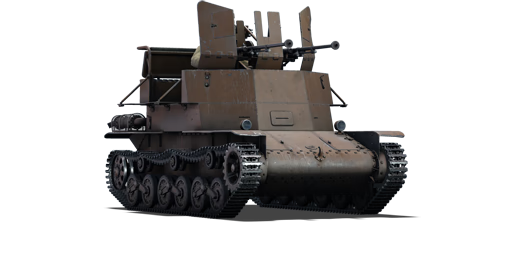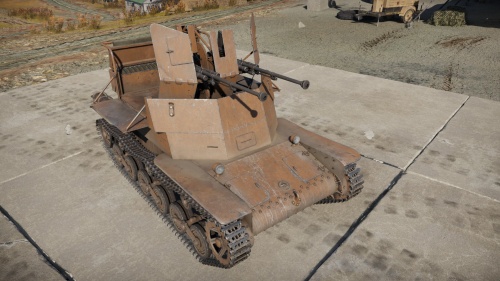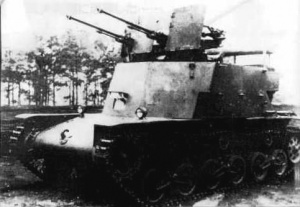Difference between revisions of "So-Ki"
(→Description) (Tag: Visual edit) |
(→Pros and cons) (Tag: Visual edit) |
||
| Line 30: | Line 30: | ||
=== Pros and cons === | === Pros and cons === | ||
| − | |||
'''Pros:''' | '''Pros:''' | ||
| + | |||
| + | * Excellent rapid fire allow for aerial overkill | ||
| + | * Great mobility allows for fast repositioning | ||
| + | * Frontal protection from light MG | ||
| + | * Freat ammo capacity | ||
| + | * Fast reloading time | ||
* | * | ||
'''Cons:''' | '''Cons:''' | ||
| + | |||
| + | * Gunner crew exposed and no rear protection | ||
| + | * Very vulnerable to artillery and aerial strafing/bombing | ||
| + | * Rapid depletion of ammo magazines | ||
* | * | ||
Revision as of 21:51, 28 April 2019
Contents
Description
The "So-Ki" is a BR 3.3 SPAAG from Japan. It features a dual Type 98 20mm guns with high velocity and great mobility.
General info
Survivability and armour
Describe armour protection. Note the most well protected and key weak areas. Appreciate the layout of modules as well as the number and location of crew members. Is the level of armour protection sufficient, is the placement of modules helpfull for survival in combat?
If necessary use a visual template to indicate the most secure and weak zones of the armour.
Mobility
Write about the mobility of the ground vehicle. Estimate the specific power and maneuverability as well as the maximum speed forward and backward.
Armaments
Main armament
Give the reader information about the characteristics of the main gun. Assess its effectiveness in a battle based on the reloading speed, ballistics and the power of shells. Do not forget about the flexibilty of the fire, that is how quickly the cannon can be aimed at the target, open fire on it and aim at another enemy. Add a link to the main article on the gun: {{main|Name of the weapon}}. Describe in general terms the ammunition available for the main gun. Give advice on how to use them and how to fill the ammunition storage.
Additional armament
Some tanks are armed with several guns in one or more turrets. Evaluate the additional weaponry and give advice on its use. Describe the ammunition available for additional weaponry. Give advice on how to use them and how to fill the ammunition storage. If there is no additional weaponry remove this subsection.
Machine guns
Offensive and anti-aircraft machine guns not only allow you to fight some aircraft, but also are effective against lightly armoured vehicles. Evaluate machine guns and give recommendations on its use.
Usage in the battles
Describe the tactics of playing in the vehicle, the features of using vehicles in the team and advice on tactics. Refrain from creating a "guide" - do not impose a single point of view but give the reader food for thought. Describe the most dangerous enemies and give recommendations on fighting them. If necessary, note the specifics of the game in different modes (AB, RB, SB).
Pros and cons
Pros:
- Excellent rapid fire allow for aerial overkill
- Great mobility allows for fast repositioning
- Frontal protection from light MG
- Freat ammo capacity
- Fast reloading time
Cons:
- Gunner crew exposed and no rear protection
- Very vulnerable to artillery and aerial strafing/bombing
- Rapid depletion of ammo magazines
History
Just before WWII, in 1938, Japan wanted to develop a SPAAG capable of shooting airplanes from low altitudes and medium altitudes. The current SPAAG were only efficient for low flying airplanes.
The objective was to provide a capable and highly mobile SPAAG to protect ground convoys from aerial attacks and provide AA cover.
Japan developed 2 prototypes by 1941: a single mounted TYpe 98 20mm gun known as "Ta-Se" and the "So-Ki" with dual-munted Type 89 20 mm gun.
The platform which was chosen for the SPAAG was the newly built Type98 Ke-Ni light tank.
The crew position featured a drive in the center and under the AA gun emplacement which was higher.A gun shield was added to offer protection for small arms fire to the gunner, but it was not designed to sustain a direct tank shell hit.A bench for the crew was mounted on the rear of the platform and could be folded to allow for placement of more ammo belts if necessary.
The total ammunition capacity was 22 belts (+ the cannons already loaded).
The Type 2 cannon featured a 900 m/s muzzle velocity which is excellent, but some sources state a 970 m/s speed with its AP-T shells.
However the So-Ki was not chosen for production because by that time AA needs had significantly evolved and the So-Ki did not answer the new needs and also because Japan lacked the sufficient ressources for mass production because of Allied progression.
Media
So-Ki Youtube Review: -> [1]
Read also
Sources
- Excellent article on the So-Ki: historical: -> [2]






